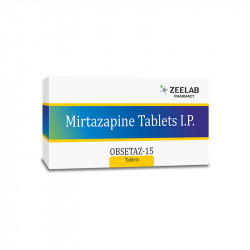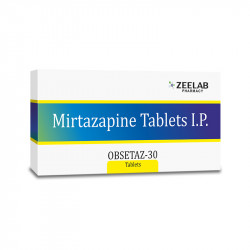Mirtazapine
Mirtazapine is an antidepressant medication primarily used to treat major depression and certain anxiety disorders. It increases the levels of brain chemicals that help in maintaining mood and emotions. This medication is often prescribed for conditions such as depression, anxiety, and insomnia associated with mood disorders. Mirtazapine can help alleviate symptoms like low mood, lack of interest, sleep disturbances, and anxiety. By enhancing the activity of key chemical messengers in the brain, Mirtazapine supports emotional stability and overall mental well-being.
Available Medicine for Mirtazapine
Uses of Mirtazapine
- Reduces Depression - This medicine helps improve mood by balancing certain brain chemicals. People often feel less hopeless or sad after a few weeks. It also boosts motivation, energy, and interest in daily life, making it easier to manage emotional challenges.
- Relieve Anxiety - It eases constant worry, nervousness, and restlessness by calming the brain’s overactivity. Many experience fewer panic episodes and feel more at ease in stressful situations. It helps create a general sense of relaxation, both mentally and physically.
- Reduce Insomnia - Mirtazapine promotes a deeper, more restful sleep, helping you to both fall asleep and stay asleep throughout the night. It is particularly beneficial for sleep troubles connected to mental health concerns.
- Stabilize the Mood - Mirtazapine works by regulating emotional highs and lows, which helps to maintain a more consistent mental state. This can improve your daily functioning and overall emotional well-being.
Mirtazapine is commonly available in India:
- Dosage Form: Tablet (Oral)
- Strength: 7.5 mg, 15 mg, 30 mg, or 45 mg (per tablet, depending on formulation)
How Mirtazapine Works
Mirtazapine works by increasing the levels of certain neurotransmitters in the brain, including serotonin and norepinephrine, which help regulate mood and stress responses. It also has sedative effects due to its ability to block certain receptors in the brain, making it useful in treating insomnia and anxiety. By balancing these brain chemicals, Mirtazapine helps to alleviate the symptoms of depression and anxiety.
Benefits of Mirtazapine
- Effectively treats symptoms of depression and anxiety
- Helps improve sleep and appetite in patients with depression
- Non-habit-forming, with minimal risk of dependency
- Can be used for individuals who do not respond to other antidepressants
How to Take Mirtazapine
Mirtazapine is usually taken once a day, typically in the evening, as it can cause drowsiness. The dosage will depend on the severity of your condition and the guidance of your healthcare provider. It is essential to take Mirtazapine exactly as prescribed, and you should not stop taking it abruptly without consulting your doctor, as it may cause withdrawal symptoms. The tablets should be swallowed whole with or without food.
Usually taken orally once daily, preferably in the evening or at bedtime, with or without food, or as directed by your physician. Swallow the tablet whole with water. Do not crush or chew unless instructed.
Duration: Typically taken daily for several weeks to months for the treatment of depression or anxiety, or as advised by your Physician.
Type of Dosage Available
- Mirtazapine 15 mg tablets
- Mirtazapine 30 mg tablets
- Mirtazapine 45 mg tablets
Side Effects of Mirtazapine
- Common side effects: drowsiness, weight gain, increased appetite, dry mouth, and dizziness.
- Serious side effects: thoughts of self-harm, extreme mood swings, irregular heartbeat, and seizures.
- If you experience severe side effects or changes in mood, seek medical attention immediately.
Safety Advice
- Inform your doctor if you have a history of heart disease, liver or kidney problems, or seizures before using Mirtazapine.
- Alcohol can enhance the sedative effects of Mirtazapine, so it is best to avoid drinking alcohol while using this medication.
- Pregnant or breastfeeding women should consult their doctor before taking Mirtazapine.
- It is important to regularly follow up with your healthcare provider during treatment to monitor progress and adjust dosage if necessary.
Frequently Asked Questions (FAQs)
Q: What is Mirtazapine used for?
A: Mirtazapine is used to treat major depressive disorder. It may also help improve sleep, appetite, and reduce anxiety symptoms in certain individuals under medical supervision.
Q: How long does Mirtazapine take to work?
A: Mirtazapine may begin improving sleep and appetite within 1–2 weeks, but full antidepressant effects typically take 4–6 weeks. Consistent, daily use is crucial for noticeable results.
Q: When should I take Mirtazapine?
A: Mirtazapine is best taken once daily at bedtime due to its sedating effects. Taking it regularly at the same time gives the best result. Do not take it without medical advice
Q: What are Mirtazapine’s common side effects?
A: Common side effects include drowsiness, weight gain, dry mouth, dizziness, increased appetite, and constipation. Report any persistent or worsening symptoms to your healthcare provider for evaluation.
Q: Can Mirtazapine cause weight gain?
A: Yes, Mirtazapine may increase appetite and cause weight gain in some patients. Managing diet, regular exercise, and monitoring weight changes with your doctor can be helpful.
Q: Does Mirtazapine cause sleepiness?
A: Mirtazapine often causes drowsiness, especially early in treatment. This sedative effect can benefit patients with insomnia. It's usually taken at night to support restful sleep patterns.
Q: Is Mirtazapine addictive?
A: Mirtazapine is not considered addictive. However, stopping it suddenly can lead to withdrawal symptoms. Hence, do not stop the medicine until your Physician tells you to do that.
Q: Can I drink alcohol with Mirtazapine?
A: Combining Mirtazapine with alcohol is not advised. Alcohol can enhance drowsiness and lower alertness. Always consult your doctor before drinking while on Mirtazapine.
Q: What if I miss a Mirtazapine dose?
A: Take the missed dose when remembered unless it’s close to the next dose. Don’t double doses to compensate. Continue with your regular schedule and inform your doctor.
Q: What if I take too much Mirtazapine?
A: Overdosing on Mirtazapine can lead to extreme drowsiness, confusion, or more serious effects. Seek emergency medical help immediately if you suspect an overdose has occurred or worsened.
Q: How long should I stay on Mirtazapine?
A: Treatment length varies by individual. Many patients stay on Mirtazapine for 6–12 months or longer. Always consult your doctor before stopping or adjusting your medication regimen.
Download India's most affordable pharmacy app
- Compare with medicine prices
- Save upto 90% on your medicine bills

Temperature Controlled storage and delivery

Regular Sanitization

Disinfected Packaging



















 Added!
Added!